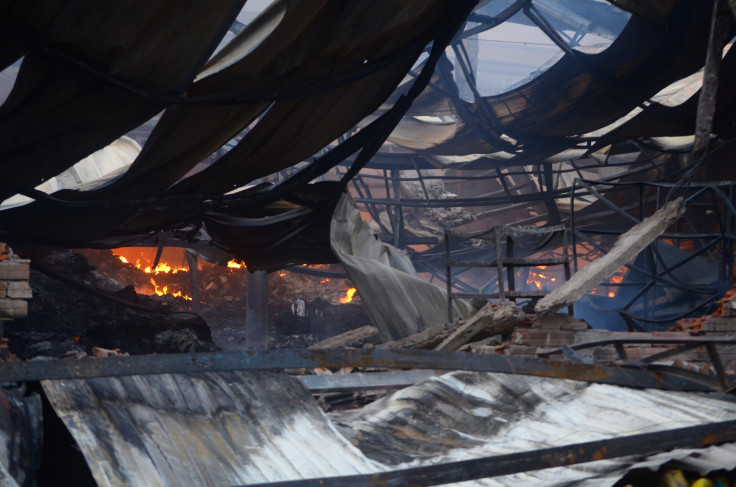Anti-China Riots In Vietnam Could Hurt Western Consumers And Brands' Supply Chains

As violent, anti-China protests convulse in industrial areas of Vietnam, the chaos threatens the nation' conspicuous success in courting foreign investment, while risking shocks to the global supply chain for manufactured products.
In a clear sign of the feared consequences, the Vietnamese Prime Minister Nguyen Tan Dung on Thursday ordered officials throughout the government to crack down on further riots, punish participants and protect employees and facilities at the foreign businesses that have been attacked, according to the English language Thanh Nien News web site.
“We usually say that Vietnam is a safe destination, so we must take concrete action, otherwise investors will hesitate to come here,” Vietnam's Minister of Planning and Investment, Bui Quang Vinh, said on Thursday at the meeting of the Vietnamese National Assembly's Standing Committee in Hanoi, according to Thanh Nien News.
The stakes are now considerable, as evident from the factories ringing Vietnam's major cities, producing goods for high-profile brands like Samsung and LG. Foreign direct investment reaching Vietnam nearly doubled to $13.1 billion in the first 10 months of 2013. Electronics companies have been especially keen to set up shop there, with electronics exports now accounting for 24.5 percent of Vietnam’s total exports, compared to just 4.4 percent in 2008.
Some manufacturing operations are already feeling the impact in a trend that could slow shipments of goods reaching shelves as far away as the United States and Europe. Hong Kong-based Li & Fung, which oversees the manufacture of goods for major brands including Wal-Mart Stores, Target Inc. and Gap Inc., is now girding for delays of about a week in receiving goods from Vietnam.
The South China Morning Post quoted the company’s CEO Bruce Rockowitz, speaking at Li & Fung's annual meeting Thursday as saying, “The good news is that this is a bit early for back to school [business]. When you get closer to the end of June and into July, then it becomes a lot more critical.”
For now the delays are minimal, he added, saying “We’re talking about a week type of delay, not months. I truly believe that not only the factories but the government will not allow this to happen.”
As if to ensure that Vietnam's government gets that message, Rockowitz added: “There are plenty of other countries that we can move business to, such as China as well as places like Bangladesh and Cambodia, but I think it’s premature to talk about moving anything.”
Some Taiwanese businesses have shut down operations amid the violence.
According to the Taiwan News, tire makers Cheng Shin Rubber Ind. Co., Ltd. and Kenda Rubber Industrial Co., Ltd. said they are closing plants temporarily to protect their workers.
Some observers expressed concern that the situation could become grave, noting this outbreak of violence has been one of the worst breakdowns in Sino-Vietnamese relations since the two neighbors fought a brief border war in 1979.
Beijing-based journalist and consultant Bill Bishop, who has lived in Beijing since 2005, said Thursday on Twitter that unlike China’s other South China Sea disputes, Vietnam is willing to fight.
“Vietnam is not like the Philippines, it won't cave over tourist boycotts & rotting mangoes. If China wants a fight Vietnam will oblige. Dangerous time,” Bishop said in reference to a Chinese tourist boycott of the Philippines and a ban on certain agricultural imports from there.
Electronics makers are also affected.
Global mobile phone giants, Samsung Electronics Co., LG Electronics Inc. and Nokia Corporation, all have operations in the country. Samsung’s first handset plant in Vietnam, a $1.5 billion investment, is its second-largest factory worldwide. Nokia opened its first Vietnamese plant last October, creating 10,000 jobs and is expected to produce 45 million handsets per quarter.
Japanese companies have also been shifting investment from China and Thailand to Vietnam. From just $169 million in 2010, Japanese investment in Vietnam grew to $4.45 billion in 2013.
The long-brewing tension over territorial claims in the South China Sea erupted this week after Beijing placed an oil offshore rig in a disputed waters, causing a strong nationalistic Vietnamese reaction against Chinese and Taiwanese factories in the country’s southern industrial zones.
The Vietnamese government also had strong words for the Chinese actions and made clear it shares in responsibility for the protests.
“The rig’s positioning is obviously part of China’s scheme to violate and then take over sovereign Vietnamese territory. China is plotting to turn an undisputed area into a disputed one, and then seize it. Legally and morally speaking, such an act is wrong,” Ngo Thuong San, chairman of the Vietnam Petroleum Association, said in an interview this week with the country’s ThanhNien.com.
© Copyright IBTimes 2024. All rights reserved.




















